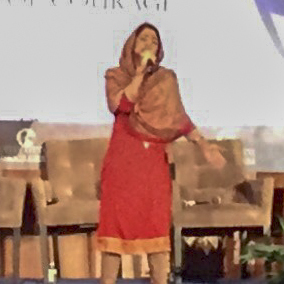Related Research Articles

Lana Michele Moorer, better known by her stage name MC Lyte, is an American rapper, disc jockey, entrepreneur and actress. Considered one of the pioneers of female rap, MC Lyte first gained fame in the late 1980s, becoming the first female rapper to release a full solo album with 1988's critically acclaimed Lyte as a Rock. The album spawned the singles "10% Dis" and "Paper Thin". In 1989, she joined the supergroup Stop the Violence Movement, and appeared on the single "Self Destruction", which was the inaugural number-one single on the Billboard Hot Rap Singles chart.

Dana Elaine Owens, better known by the stage name Queen Latifah, is an American rapper, actress and singer. She has received various accolades, including a Grammy Award, a Primetime Emmy Award, a Golden Globe Award, three Screen Actors Guild Awards, and two NAACP Image Awards, in addition to a nomination for an Academy Award. In 2006, she became the first hip hop artist to receive a star on the Hollywood Walk of Fame.

The music of Afghanistan comprises many varieties of classical music, folk music, and modern popular music. Afghanistan has a rich musical heritage and features a mix of Persian melodies, Indian compositional principles, and sounds from ethnic groups such as the Pashtuns, Tajiks and Hazaras. Instruments used range from Indian tablas to long-necked lutes. Afghanistan's classical music is closely related to Hindustani classical music while sourcing much of its lyrics directly from classical Persian poetry such as Mawlana Balkhi (Rumi) and the Iranian tradition indigenous to central Asia. Lyrics throughout most of Afghanistan are typically in Dari (Persian) and Pashto. The multi-ethnic city of Kabul has long been the regional cultural capital, but outsiders have tended to focus on the city of Herat, which is home to traditions more closely related to Iranian music than in the rest of the country.

Afghan Star was a reality television show competition that searched for the most talented singers across Afghanistan. The program was broadcast on the TOLO channel. Afghan Star premiered in 2005, four years after the fall of the Taliban, which had outlawed singing in 1996, and ended after fifteen seasons in 2021 after the Taliban regained power and banned music. It was one of the most-watched shows in Afghanistan.

Women's rights in Afghanistan have oscillated back and forth depending on the time period as well as the regime in power. After King Amanullah Khan's attempts to modernize the country in the 1920s, women officially gained equality under the 1964 Constitution. However, these rights were taken away in the 1990s through different temporary rulers such as the mujahideen and the Taliban during the Afghan civil war. During the first Taliban regime (1996–2001), women had very little to no freedom, specifically in terms of civil liberties. When the Taliban was overthrown by the United States following the 9/11 attacks, women's rights gradually improved under the presidential Islamic Republic of Afghanistan. Women were de jure equal to men under the 2004 Constitution.

Mozhdah Jamalzadah is an Afghan Canadian singer, actress, model and activist. Jamalzadah formerly hosted The Mozhdah Show in Afghanistan, which discussed social issues such as women's rights.

Shadia Mansour, also known as "the first lady of Arabic hip hop" is a British-Palestinian rapper who performs in Arabic and English. Much of her music revolves around Middle Eastern politics.

Onika Tanya Maraj-Petty, known professionally as Nicki Minaj, is a Trinidadian-born rapper and singer based in the United States. Often referred to as the "Queen of Rap", she is known for her musical versatility, animated rap flow, alter egos, and influence in popular music. She first gained recognition after releasing three mixtapes between 2007 and 2009.
Misogyny in rap music refers to lyrics, videos, or other aspects of rap music that support, glorify, justify, or normalize the objectification, exploitation, or victimization of women. It is an ideology that portrays women as objects for men's ownership, use, or abuse. It diminishes women to expendable beings. It can range from innuendoes to stereotypical characterizations and defamations.

Fawzia Koofi is an Afghan politician, writer, and women's rights activist. Originally from Badakhshan province, Koofi was recently a member of the Afghan delegation negotiating peace with the Taliban in Doha Qatar. She is an ex Member of Parliament in Kabul and was the Vice President of the National Assembly.
Soosan Firooz, sometimes spelled Susan Feroz, is an Afghanstani actress and rapper. She has been described as Afghanistan's first female rapper. She is a controversial figure, challenging societal norms and the traditional role of Afghan women.
Hip hop feminism is a sub-set of black feminism that centers on intersectional subject positions involving race and gender in a way that acknowledges the contradictions in being a black feminist, such as black women's enjoyment in hip hop music and culture, rather than simply focusing on the victimization of black women in hip hop culture due to interlocking systems of oppressions involving race, class, and gender.
Rape is a major issue in Afghanistan. A number of human rights organizations have criticized the country's rape laws and their enforcement.
Farkhunda Zahra Naderi is an Afghan politician and women's right activist. She is a member of the Afghanistan's High Council for National Reconciliation (HCNR) chaired by Abdullah Abdullah. Previously she served as a senior advisor to president Ashraf Ghani in United Nations Affairs. Before that she served as a member of Parliament, where she was elected as an MP in the 2010 Afghan Parliamentary Election.
Sasha P, also known as the "First Lady of Nigerian Hip Hop", is a Nigerian rapper, musician, businesswoman, lawyer, and motivational speaker.
Feminist activism in hip hop is a feminist movement based by hip hop artists. The activism movement involves doing work in graffiti, break dancing, and hip hop music. Hip hop has a history of being a genre that sexually objectifies and disrespects women ranging from the usage of video vixens to explicit rap lyrics. Within the subcultures of graffiti and breakdancing, sexism is more evident through the lack of representation of women participants. In a genre notorious for its sexualization of women, feminist groups and individual artists who identify as feminists have sought to change the perception and commodification of women in hip hop. This is also rooted in cultural implications of misogyny in rap music.

Sonita Alizadeh is an Afghan rapper and activist who has been vocal against forced marriages. Alizadeh first gained attention when she released "Brides for Sale," a video in which she raps about daughters being sold into marriage by their families. With the help of Rokhsareh Ghaem Maghami, an Iranian documentary filmmaker who over three years documented her story in the film Sonita, Alizadeh filmed the video to escape a marriage her parents were planning for her, even though it is illegal for women to sing solo in Iran, where she was living at the time. After releasing the video on YouTube, Alizadeh was contacted by the Strongheart Group, which offered her a student visa and financial help to come and study in the United States of America, where she then relocated and has resided since. In 2015, she was listed as one of BBC's 100 Women.

Belcalis Marlenis Almánzar Cephus, known professionally as Cardi B, is an American rapper. She is regarded as one of the most commercially successful female rappers of her generation. Born and raised in New York City, she first gained popularity through videos shared on Vine and Instagram. From 2015 to early 2017, she appeared as a regular cast member on the VH1 reality television series Love & Hip Hop: New York, which depicted her pursuit of her music aspirations, and earned further recognition with the release of her two mixtapes: Gangsta Bitch Music, Vol. 1 (2016) and Vol. 2 (2017).
Sorouri is an Iranian surname. Notable people with the surname include:

Megan Jovon Ruth Pete, known professionally as Megan Thee Stallion, is an American rapper. Originally from Houston, Texas, she first garnered attention when videos of her freestyling became popular on social media platforms such as Instagram. She signed with 300 Entertainment in 2018, and saw her mainstream breakthrough in the following year with the release of her singles: "Hot Girl Summer" and "Cash Shit" ; the former peaked at number 11 on the Billboard Hot 100, while the latter received quadruple platinum certification by the Recording Industry Association of America (RIAA). The latter song was also included on her commercial mixtape Fever (2019), which was followed up with her extended play Suga (2020)—both of which peaked within the top ten of the Billboard 200.
References
- 1 2 3 4 5 6 "Afghanistan's first female rapper: 'If I stay silent, nothing will change'". the Guardian. 1 December 2016.
- ↑ "Paradise Sorouri".